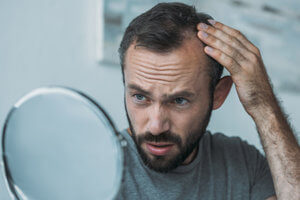
Your skin isn’t the only feature that shows the signs of aging. As you get older your hair begins to change, too. Here are the most common changes in your hair that you may notice as you get older, including advice on how to address these issues.
Graying
Graying is due to the loss of pigment-producing cells called ‘melanocytes’ in the base of the hair follicles. When less melanocyte cells are present, the result is less pigment being made and transferred into the outer shell (‘cortex’) of your hair shaft, resulting in gray hair.
Thinning hair
Numerous studies have shown a decrease in hair diameter with age. Hair is generally larger and thicker when young and then decreases steadily in size, beginning around age 40. Pre-menopausal women have larger hair shaft diameters (thicker hair) than post-menopausal women. This is likely due to a decrease in the population of stem cells in the hair follicle which determine the size of the hair shaft.
Hair Texture
Hair often becomes “frizzier” with age. Many researchers suspect this is due to the loss of synchronization or timing of hairs as they grow out together and curve. The curve of the hair is determined by the amount of bonding among the strands. If the hairs stop synchronizing their timing as they grow out the production of waves or curves is incomplete and the result is frizz.
Sheen
The sheen or shininess of hair results from the reflection of light off the cuticle (outer layer) of the hair shaft. The cuticle is composed of many plates that lie next to each other like pieces of a puzzle. The lipid (oil) in the skin acts like glue between the gaps in these puzzle pieces and will increase shine. With age the reverse happens; the lipids decrease, and the hair loses its sheen.
Brittle
With age, the strength of hair decreases as the amount of bonding between hair strands becomes fewer. With less bonds between and among hairs, the hair can be more easily traumatized and result in breakage.
How to help your aging hair?
“Because the hair is often drier, more brittle, and less shiny with age, we need to adjust our hair care practices,” says Dr. Christine Shaver. Her suggestions include:
- Use wider tooth combs to not yank and hurt delicate hair.
- Cooler showers can also help maintain the natural oils on the scalp and hair as routine hot showering dries the scalp and strips hair of its natural oils.
- Conditioning may be more important to add back additional protein barriers to protect the hair shaft.
- Avoidance of chemical and heat should always be emphasized as this can cause hairs to weaken and subsequently crack, break, and cause more dryness and frizz.






